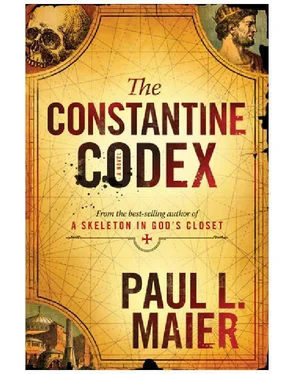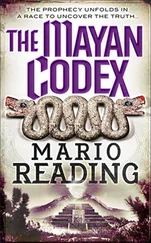Paul Maier - The Constantine Codex
Здесь есть возможность читать онлайн «Paul Maier - The Constantine Codex» весь текст электронной книги совершенно бесплатно (целиком полную версию без сокращений). В некоторых случаях можно слушать аудио, скачать через торрент в формате fb2 и присутствует краткое содержание. Жанр: Триллер, на английском языке. Описание произведения, (предисловие) а так же отзывы посетителей доступны на портале библиотеки ЛибКат.
- Название:The Constantine Codex
- Автор:
- Жанр:
- Год:неизвестен
- ISBN:нет данных
- Рейтинг книги:5 / 5. Голосов: 1
-
Избранное:Добавить в избранное
- Отзывы:
-
Ваша оценка:
- 100
- 1
- 2
- 3
- 4
- 5
The Constantine Codex: краткое содержание, описание и аннотация
Предлагаем к чтению аннотацию, описание, краткое содержание или предисловие (зависит от того, что написал сам автор книги «The Constantine Codex»). Если вы не нашли необходимую информацию о книге — напишите в комментариях, мы постараемся отыскать её.
The Constantine Codex — читать онлайн бесплатно полную книгу (весь текст) целиком
Ниже представлен текст книги, разбитый по страницам. Система сохранения места последней прочитанной страницы, позволяет с удобством читать онлайн бесплатно книгу «The Constantine Codex», без необходимости каждый раз заново искать на чём Вы остановились. Поставьте закладку, и сможете в любой момент перейти на страницу, на которой закончили чтение.
Интервал:
Закладка:
“The monks were so outraged they stoned her to death.”
“What?”
“All right, I jest. Her little escapade doomed Greek beauty contests for decades after that.”
Shannon shook her head, laughing. “Well, I wasn’t really serious. It’s just that it’s going to be hard sitting here waiting while you have all the fun.”
“I promise to give you hourly updates by cell phone.”
Shannon supposed that she would have to be content with that. After Jon drove off for the embarkation port east of Thessalonica, she returned to their hotel room to wash her hands. There, next to the wall socket, lay Jon’s cell phone, resting comfortably in its charger. So much for the hourly updates.
Jon was convinced that if ever some precious ancient biblical manuscripts were waiting to be discovered, they would likely be lurking in a monastery archive at Mount Athos. For centuries, the holy men living in these monasteries had devoted themselves to worship, meditation, and prayer, as well as to preserving the relics and manuscripts in their possession. Who knew what ancient treasures lay buried there in plain sight, for those who knew where to look? The authorities at the Holy Mountain were well aware of this potential as well and had begun a lengthy project of cataloging every manuscript on Mount Athos. That was the good news. The bad was this: the process might take thirty years. Jon’s other mission, then, would be to ask Abbot Miltiades if his ICO might send scholars and photographers to Mount Athos to assist in accelerating the process.
Miltiades Papandriou was the hegoumenos -abbot, archimandrite-of Megiste Lavra, the Great Lavra monastery at the tip of Mount Athos, which had the primacy on the peninsula. He was a rare combination of gifted administrator and world-class manuscript scholar. Both Jon and Shannon knew of his reputation long before their trip to Greece.
Attache case in hand, Jon boarded a wooden Greek ferry painted royal blue and blinding white, the national Hellenic colors. He quickly donned sunglasses in order to save his eyesight. Aboard were a curious collection of robed clergy and monks in black, along with supplies for the monasteries. Nothing female was in sight, of course, except for several crates of cackling hens. Jon could only hope that the weather would stay favorable, recalling that a fierce storm had destroyed an entire Persian fleet off the coast of Mount Athos in 492 BC, two years before the great Battle of Marathon. The Aegean, however, was on its best behavior that morning, a placid, quiet sea interrupted only by the chug-chug-chugging of the ancient diesel engine propelling their craft.
An hour into the voyage, Jon reached for his cell phone to give Shannon the first of his promised updates. It was then that he remembered where it was: plugged into his charger at the hotel in Thessalonica. Mentally kicking himself, he quickly glanced down to see his attache case safely nestled at his feet. Evidently, absentminded professors must be selective in what they forget, Jon assumed.
In late afternoon, they sailed into the port of Dafni. Disembarking, the passengers went through a customs check at the port and were waved through turnstiles by a white-helmeted official-all, that is, except for Jon. Because Archbishop Christodoulos in Athens had generously cleared the way for Jon, he had not stopped at the Pilgrim’s Bureau in Thessalonica to get a diamoneterion-a special three-day pass to visit Mount Athos. Each of the other passengers had one; Jon did not. The customs agent, who knew no English and seemed not to understand Jon’s more classical Greek, let fly with torrents of angry shouts at Jon, almost as if he were a female interloper. Next the agent turned his anger on the boat’s captain, evidently for his daring to bring along a passenger without a diamoneterion. As calmly as he could, Jon opened his attache case and handed the official the authorizing letter from the archbishop of Athens and all Greece.
Scowling, the officer had just started reading the letter when a jeep pulled up, driven by a purple-robed monk. The brother stepped out of the vehicle, saw Jon being detained, and then unloaded an even louder torrent of furious Greek at the customs official. The agent took umbrage at that and unleashed a response in stentorian tones, complete with gestures to suit the occasion. Jon had always thought that two Italians arguing after a traffic accident usually set the record for altercation volume. He was wrong. The decibels of this disagreement topped them all.
Suddenly all became quiet. The monk looked at Jon and said in a thick accent, “Welcome to you, Dr. Weber! And please to forgive this unpleasantness. This man’s father was a donkey! I give you ride to the monastery.”
Rather sheepishly, and avoiding eye contact, the customs agent handed Jon the archbishop’s letter and retreated into his guard shack. Jon thanked the monk and climbed into his jeep. They drove southward along the coastal road for a brief time and then headed up into the mountains, where the drive became an adventure. Roads were not paved on Mount Athos but consisted of stabilized gravel. The driver himself seemed to have studied not at a seminary but at Daytona. Whether or not he was trying to impress his passenger, some of his speeding around hairpin curves was just plain dangerous, and Jon expressed his concern as best he could. The driver merely offered Jon a toothy smile, almost as if to say, “Yes, I know; you want me to go faster.” Was this man from al-Qaeda, a terrorist in training?
After twenty harrowing minutes, they skidded to a halt at the Great Lavra monastery, perched at the very tip of the Athos peninsula. Jon stepped out and tried to take it all in: the great gray walls, the fosse, the turrets, the crenellated terraces.
What surprised him most, however, was the unexpected presence of Miltiades Papandriou himself, who walked across the courtyard to greet him, wearing a warm smile that seemed to soften his otherwise-formidable bearded countenance. His spare frame stood erect at more than six feet, his shoulders not hunched over nor his eyes bleary from a lifelong perusal of manuscripts. This man was clearly in charge on the Holy Mountain.
“Greetings in the name of our Lord and Savior, Jesus Christ, Professor Weber,” he said in flawless English. “We are honored by your visit.”
“Quite the contrary, Your Grace. I am the one honored.”
“Ever since we received word from Archbishop Christodoulos that you would come to Mount Athos, many of our brothers have read or reread your remarkable book on Jesus. I think it is a model of excellent scholarship.”
“Thank you, but the chapter on sources rests heavily on your own brilliant manuscript research, Your Grace.”
Miltiades held up the palms of his hands as if to ward off the compliment, then showed Jon to his guest quarters.
At dinner that evening, Jon was invited to give a brief talk to the resident monks in the refectory, which was enthusiastically received. Only because these poor fellows have such limited exposure to diversion of any kind.
The next morning, he was given a guided tour of the monastery, during which he paid special attention to the archives. Archimandrite Miltiades joined Jon in the refectory after the tour, and they both climbed the stairs to his office in a turret overlooking the entrance to the monastery. The office was well insulated from the heat of summer or the cold of winter by books of every description, including the sort that caught Jon’s eye: ancient tomes covered in tattered leather, some with spines missing. Atop the broad desk of polished maple lay a beautifully illuminated medieval codex.
“My-how you say it?-my hobby is to bring out a modern edition of the sermons of St. John Chrysostom,” the genial abbot said, pointing to the codex, “as annotated by medieval monks.”
Читать дальшеИнтервал:
Закладка:
Похожие книги на «The Constantine Codex»
Представляем Вашему вниманию похожие книги на «The Constantine Codex» списком для выбора. Мы отобрали схожую по названию и смыслу литературу в надежде предоставить читателям больше вариантов отыскать новые, интересные, ещё непрочитанные произведения.
Обсуждение, отзывы о книге «The Constantine Codex» и просто собственные мнения читателей. Оставьте ваши комментарии, напишите, что Вы думаете о произведении, его смысле или главных героях. Укажите что конкретно понравилось, а что нет, и почему Вы так считаете.












